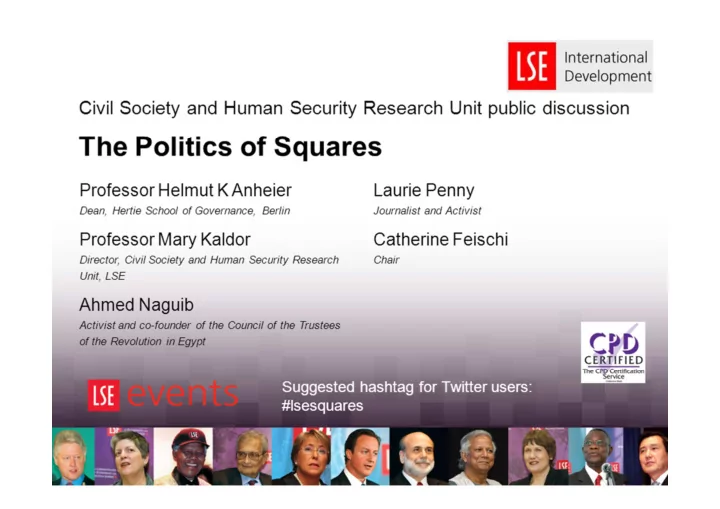

Civil Society and Human Security Research Unit public discussion The Politics of Squares Professor Helmut K Anheier Laurie Penny Dean, Hertie School of Governance, Berlin Journalist and Activist Professor Mary Kaldor Catherine Feischi Director, Civil Society and Human Security Research Chair Unit, LSE Ahmed Naguib Activist and co-founder of the Council of the Trustees of the Revolution in Egypt Suggested hashtag for Twitter users: #lsesquares
Swarm Intelligence? Occupy & co. in Germany Helmut K. Anheier Hertie School of Governance, Berlin The Politics of Squares Civil Society and Human Security Research Unit public discussion Wednesday, 2 May 2012 London School of Economics and Political Science 2
An Explorative Research Project Phase I: Mustering and mapping the entire field of subterranean politics: weighing groups by set of criteria: - New or newly emerging - Subterranean, not affiliated - Relevance ( google insight ) Phase II: In-depth Case Study: ‚ Wutbürger ‘ & Occupy - Extensive media content analysis & comprehensive research review - Structured interviews with Occupy activists - Participant observation in Berlin 3
An Explorative Research Project Are the recent European protest activities about austerity only? Or is there a subterranean crisis of (representative) democracy in Europe? Considering the German case: - Growth: 2011 by 3.0%; projection for 2012 is at 0.9%, higher for 2013 - Budget deficit: 1.0% complying with Maastricht criteria for the 1 st time since the crisis. - Unemployment: 7.4% in February 2012; November 2011 was the best month in employment figures since early 1990s 4
Findings: Wutbürger - „Word of the Year“ 2010 in Germany: Wutbürger – ‚angry citizen‘ - What is it? spontaneous public expressions of opposition to formerly non-controversial infrastructure projects – train station in Stuttgart; airport in Berlin. Subsequent organisation and politisation, media resonance - Legitimacy through administrative process being challenged; how much popular vote needed? Example: Stuttgart 21 - Who they are : educated (more than 70% hold university qualifying high-school degree); not that young (75% were older than 35 years); dominantly male (59,7%) - A new generation? 60% have rarely participated in protests prior to Stuttgart21, 16 % never at all. When they protest, they protest a lot ( 80% at least once a week ) - Why they turn out : 66.3% feel not adequatly included in decision-making; - 80% are dissatisfied with the current political and social situation eventhough they are satisfied with their own - Note: Popular Referendum approved Stuttgart 21! 5
Findings: Swarm Intelligence Groups Swarm Intelligence online Example: Guttenplag - Forced resignation by Minister of Defense Theodor zu Guttenberg after uncovering that his doctoral thesis was full of plagiarism; - Guttenplag was website established to systematically track sections of plagiarism in the thesis: decentralized, nonhierarchical and transparent 6
Findings: Occupy Occupy: Swarm Intelligence on the street – Movement without crisis? - Activists have ascended on the public stage since 15 Oct. 2011 (international action day) - Occupy is label for various groups: Echte Demokratie Jetzt, Campact, alex11, aCAMPada Forms of protest: demonstration marches • • asambleas in public places / occupation of public spaces (incl. camping) • Carnival of the disgusted: ironic 1% protests / rich people’s flash mobs, • Political education for empowerment • Frankfurt activists founded European Occupy Central Bank 7
Findings: Occupy • Actors - Majority is between 25-35 years old, in some groups majority is male - Diverse background: mostly educated, students and self-employees, retirees, employees and unemployed people – also: homeless, student activists, employees - App. half of activists had been active before: for peace, against nuclear energy, for a basic income, or for global justice • Motivations - Consistent message: No sense of adequate political representation in established institutions; - Strong disapproval of political actors, processes and institutions - Sense of urgency, desire to participate and practice alternatives 8
Findings: Occupy • Issue Framing - No coherent agenda formulation – seems presumptuous to many - “ There is no need to come up with specific topics, since there are enough pressing issues as it is” - Europe does not feature prominently in discussions • Modes of Interaction - Adhere to strictly democratic procedures - Three pillars: non-violence, transparency and the absence of hierarchies - The swarm: “ Occupy rejects the concept of a small circle protecting their knowledge - “everything works based on the division o labor: everyone participated the way they could and wanted to ” 9
A Debate on Europe? − A debate on Europe is absent in many groups and activities − Among activists: EU viewed as proxy for a disdainful style of politics – but solidarity across Europe − Global and European governance challenges vs. conspicous localism 10
Summary And Questions - Germany is a strong case for Subterranean Politics: it goes beyond traditional social conflicts and captures sense of alienation and discomfort with regards to established actors, processes and institutions - The practices of subterranean politics in Germany aim at more participatory, transparent, basis-democratic and web-based modes of governance, which activists are eager to employ themselves. - The debate on Europe is at a critical turning point : conspicuous localism should worry supporters of the European project and policy makers - Scope and scalability of Occupy and ‚Wutbürger‘: new activists, but small numbers? - Is this a social movement after all? - Swarm intelligence as a genuinely new feature? 11
Civil Society and Human Security Research Unit public discussion The Politics of Squares Professor Helmut K Anheier Laurie Penny Dean, Hertie School of Governance, Berlin Journalist and Activist Professor Mary Kaldor Catherine Feischi Director, Civil Society and Human Security Research Chair Unit, LSE Ahmed Naguib Activist and co-founder of the Council of the Trustees of the Revolution in Egypt Suggested hashtag for Twitter users: #lsesquares
Recommend
More recommend